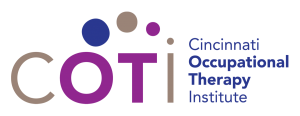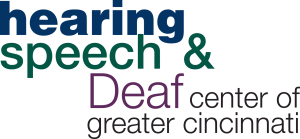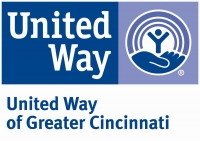Behavioral Health
Behavioral Health Services will be provided by licensed clinical social workers from Central Clinic, Cincinnati’s leader in mental health services. Behavioral health services follow evidence-based models and are designed to enhance the social and emotional development of very young children by strengthening parent-child attachment through play therapy.

Occupational Therapy
Cincinnati Occupational Therapy Institute will partner with Cincinnati Occupational Therapy Foundation to provide occupational therapy services focused on the motor and sensory development of the child and the sensory needs of the caregiver as well as the child.
Speech Therapy
Speech and Language Pathologists from the Hearing Speech and Deaf Center of Greater Cincinnati evaluate and treat communication disorders that may impair an individual’s ability to speak, read, write, or understand what others are saying.
What is Developmental Trauma
Developmental trauma is the exposure to adverse experiences such as violence, abuse, neglect and separation from a caregiver repeatedly over time and during critical periods in a child’s development. It is sometimes referred to as complex trauma. It is complex because there are at least two problems that occur together: the problem of exposure to negative experiences and the inability of the young child to adapt to those negative experiences.
Developmental trauma, because of its impact on the brain at a critical time, can affect a child’s development and result in delays in speech and language, sensory processing, social skills, and motor skills. A child may be unable to cope with the sensory input in the environment (such as smells, noises, touches, movement, and visual stimuli). Consequently, the child becomes easily overwhelmed and over-reactive – often exhibiting severe “temper tantrums,” sleep and eating disturbances, hyperactivity, or difficulty processing language. In turn, these types of behaviors significantly impact a child’s quality of life and the ability to form relationships with parents or caregivers. Ultimately, the child’s delays and maladaptive responses impact the whole family.
Connections for Life addresses all these problems by providing an integrative program where all the experts are present in treatment at the same time: caregiver, behavioral health therapist, occupational therapist, and speech and language pathologist, working to improve everyday life for the child and the family.
Why Co-Treatment
Benefits of the Collaborative Model
Connections for Life is unique in that it uses a collaborative model to address the needs of children who have experienced complex trauma within critical developmental periods. Multiple disciplines work with a child on his or her goals at once, which allows families to attend a single session and receive the benefits of all three disciplines. The three disciplines at Connections for Life include behavioral health therapy, occupational therapy, and speech and language therapy. Additionally, caregivers are included in treatment sessions to strengthen the attachment with the child. Each professional conducts an appropriate formal assessment from which they formulate relevant goals. Together the team considers the interests of the child as well as the primary concerns of the caregiver to establish a treatment plan that will address the child’s needs. Since trauma manifests differently in every individual, the collaborative model allows therapists to assist one another in addressing each child’s distinct problem areas.
Who We Are
Kristen Brokamp, MOT, OTR/L – Occupational Therapist. Kristen is a graduate from the University of Indianapolis’ occupational therapy program. She works for Cincinnati Occupational Therapy Institute in their community based programs, which includes providing services in the schools, summer social skills groups, and COTI’s summer camp, Camp OdakOTa. She is a lifelong resident of Cincinnati and a big Ohio State Buckeyes fan.
Alexandra Hornak, M.A. CF-SLP – Speech and Language Pathologist. Originally from northern Ohio, Alex received her Bachelor of Communication Sciences and Disorders from Cleveland State University in 2016. She continued her education at Cleveland State to obtain her Master’s in Speech-Language Pathology in 2018. Since then, Alex relocated to Cincinnati where she has been working for the Hearing Speech and Deaf Center of Greater Cincinnati, treating both the adult and pediatric population. Alex has been part of the CFL team since June of 2018.
Breanna Lynch, MOT, OTR/L – Occupational Therapist. Breanna earned her masters degree in occupational therapy from Xavier University. She has relocated from New York to join the team at Connections for Life. She also works at Cincinnati Occupational Therapy Institute in their Blue Ash and Anderson clinics.
Maria Piombo, Ed.D., LPCC-S, Director Connections for Life. Dr. Maria Piombo received her B.A. from Northwestern University and M.A. and Ed.D. from the University of Cincinnati’s Counseling Program. Her counseling work during the past 27 years has included prevention, intervention, and clinical services. Dr. Piombo is presently the Director of the Child and Family Treatment Center (CFTC), a division of Central Clinic Behavioral Health. She oversees four different programs within CFTC: Ready to Learn School-Based Services, The Young Child Institute, Connections for Life, and the Child and Adolescent Counseling Services.
Ariel Smallwood, MA, LPC – Mental Health Therapist. Ariel is originally from eastern Kentucky, receiving a bachelor’s degree in Psychology from Morehead State University. She moved to Cincinnati to attend the University of Cincinnati’s Mental Health Counseling Program. She graduated with a master’s degree in mental health counseling in 2015. She works for Central Clinic in their school based programs and Connections for Life. Ariel enjoys working with the early childhood population and likes working alongside other professionals for a multi-disciplinary approach.



